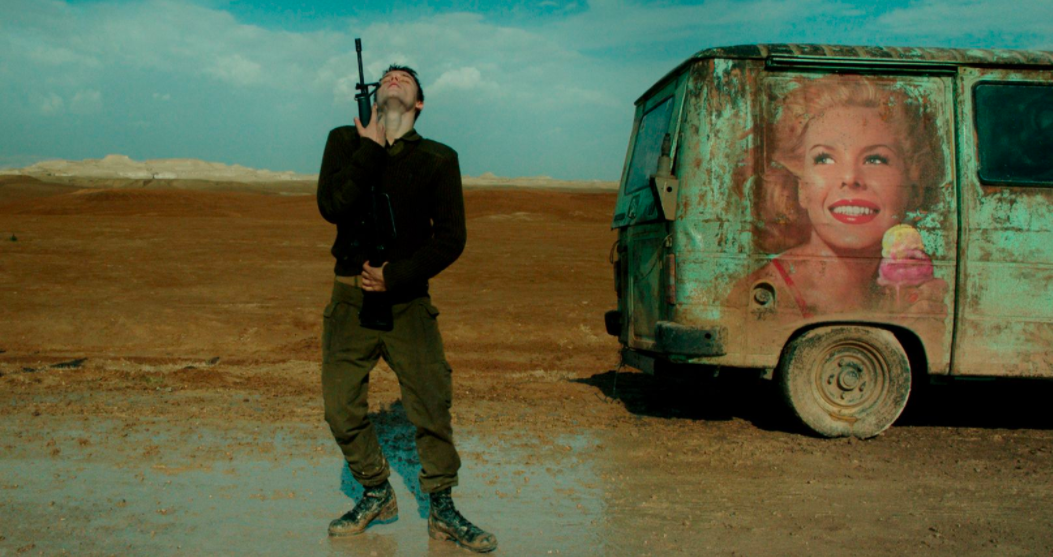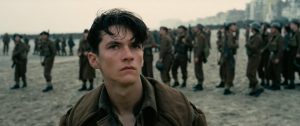Foxtrot begins with a faint. Men in uniform have come to the home of affluent Tel Aviv couple Michael and Dafna (Lior Ashkenazi and and Sarah Adler, respectively), their arrival a tacit announcement of tragedy: Michael and Dafna’s son has fallen in the line of duty. Backdropped by art that looks like grief itself—a framed canvas of menacing, concentric squares—Dafna collapses. What follows is a nearly perfect film from director Samuel Maoz, a visually inventive, meticulously curated triptych of the real and the absurd.
Sedated by the soldiers, Dafna spends a majority of the film’s first third crumpled in bed as Michael grapples with his anguish alone. He moves through their apartment as if through water, drinking only at the behest of a concerned official until he chokes and sputters. Alone in the bathroom, he bites his fist and runs a stream of hot water on his shaking hand until an angry welt blossoms. Ashkenazi deftly portrays a man unmoored. His kind eyes adrift, he inhabits all the ambiguity of fresh, complete agony.
Ashkenazi’s performance—like all the wonderful acting that lives in this film—is enhanced by Foxtrot’s distinct visual style. Maoz teamed up with his Lebanon collaborator Giora Bejach (the film’s director of photography) to produce a world of army greens and rusty reds, of striking geometry and surprising framing. In a film where not much happens, images like a dog jumping behind a door of frosted glass or four cans of army-issued rations set to heat on a grill help introduce an atmosphere that is both meditative and menacing.
Foxtrot exists in shades of green and brown and red. Every frame is in some way infused with this spectrum of colors—red wetness around green eyes, a decorative splatter of fake blood on an olive pillowcase—and to watch the unexpected ways Maoz and production designer Arad Sawat introduce this palette is to solve a visual puzzle. Thanks to this consistency, Foxtrot could be The Shape of Water’s bleaker, subtler cousin. Such neglect to the principles of realism feels more at home in fantasy flicks than an Important Drama about war and grief, but the dissonance elevates the film into the realm of myth.
If not with magic, Foxtrot is tinged with the surreal. At an isolated border outpost, young men stand guard, their lives more metaphor than substance. Nearly every scene here feels like it could be a prize-winning short, so contained and poignant are the parts that make up the whole. Stopped by the soldiers at the checkpoint, a woman in a gown empties the innocuous contents of her clutch onto the muddy ground. As she stands waiting by her car for the all clear sign, it starts to rain. This scene is beautiful, absurd, and deeply, deeply sad. There is an entire film’s worth of story to explore within this single shot but Foxtrot doesn’t linger, nor does it become overly fanciful. (The closest thing it has to a Del Toro monster is an ambling camel.)
Maoz’s film concerns Israel and the IDF but it is not about either of those things. The scene that inspired Israel’s Minister of Culture Miri Regev to condemn Foxtrot without having watched the film is dramatic, but it’s the fragile humanity that makes it tragic. In a March interview with NPR, Maoz reacted to anti-Israel accusations directed at him. “If I criticize the place [where] I live, I do it because I worry. I do it because I want to protect it. And I do it from love.”
Everything about Foxtrot serves that project. There is an animated interlude made from the inked sketches of one soldier (Yonathan Shiray) that illustrates the foibles of his father. Back at Michael and Dafna’s, hands, both red from self-inflicted wounds, graze the other. These moments do not a hero make, but Regev would be hard-pressed to say they do not render these characters intensely, heartbreakingly human.
In what is the most unabashedly joyous minute of the movie, a soldier (Itay Exlroad) dances with his rifle, unspooling himself against a vibrant blue sky as his peer looks on. Liberating and life-affirming, the scene could have only come from love.







